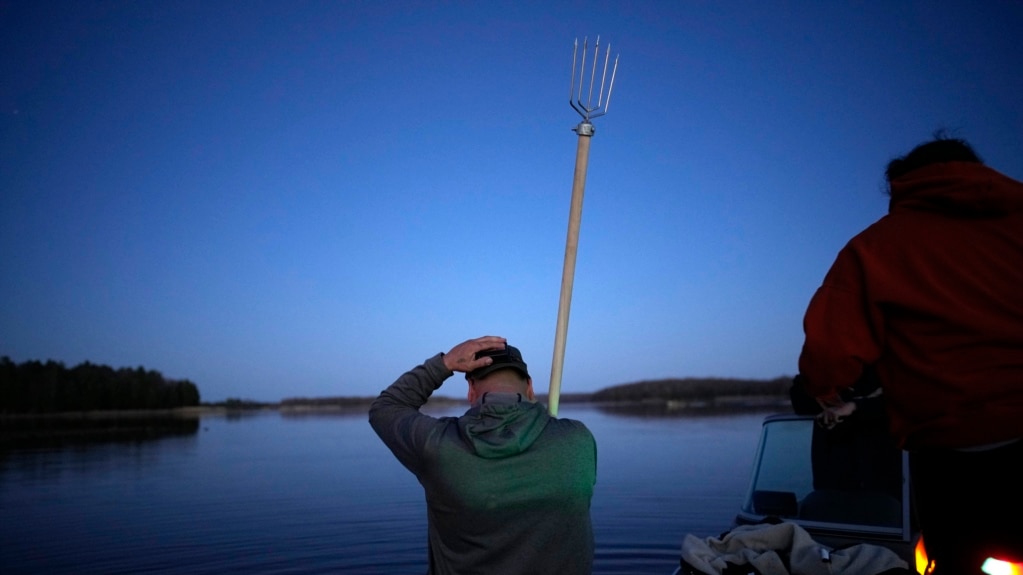Cold nights, on Chippewa Flowage, a lake in the state of Wisconsin, do not stop 15-year-old Gabe Bisonette. He has been learning spearfishing, a tradition of the Ojibwe Native American tribe, for a long time. Ojibwe and other indigenous people are fighting to keep this way of fishing alive.
But the number of walleye fish in the lake is decreasing due to warming waters, seasonal changes and lake development. Losing this fish would mean losing a food source for community members and a deep connection to tradition and nature.
Many in the community say that with science and good management, they will be able to continue this tradition in the future. But there is also concern about the changes that are already happening.
“We’ve seen things here over the last couple of years that I’ve never seen before,” said Brian Bisonette, Gabe’s uncle. He and Gabe are both members of the Lac Courte Oreilles Tribe. The group is one of the bands of the Ojibwe people.
Bisonette is the conservation director of Lac Courte Oreilles Conservation Department. He said past tribal leaders understood the need for securing enough food to live in their homeland. So, they got the right to hunt, fish, and gather wild rice in certain areas as part of 19th-century treaties. These same treaties gave land to settlers.
But for a long time after that, the state of Wisconsin lessened treaty rights of tribes. In some cases, officials even arrested members for taking part in tribal activities.
A 1983 Supreme Court decision held up the rights of the Ojibwe people. As a result, angry locals showed up at lakes to trouble tribal members. They damaged vehicles, shouted racist comments and shot at spearfishers.
Today, officials guard every boat landing. But incidents still happen.
Tribes and local conservation teams are finding ways to protect walleye and the spearing tradition. Spearfishers are required to get permits that limit the number of fish they can take. And some lakes are filled with fish born in a hatchery and released into the lake. But still the goal in many cases is to increase natural reproduction.
“Whether it’s tribal or non-tribal, this is a concern for all of us,” Bisonette said.
Lake ecosystems in danger
On another lake, Lac Courte Oreilles, Department of Natural Resources (DNR) biologist Max Wolter and supervisor Angelena Sikora look for walleye, too.
They capture, measure, and record the size and sex of the fish. The goal is to get a clear picture of the fish populations of inland lakes, including Chippewa Flowage and Lac Courte Oreilles.
The DNR gathers this information in partnership with tribal conservation partners and the Great Lakes Indian Fish and Wildlife Commission.
After examining the numbers, experts across all groups are noticing signs of change.
Wolter said, “It’s not that the adult walleye are just dying out, it’s that the amount of reproduction isn’t happening at the same levels that it used to, especially in certain water bodies.”
Climate change is affecting the home of the fish. Walleyes do best in unclear waters. But because of long periods of severely dry weather, or drought, the flow of rivers into the lake has lessened. This leads to clearer water.
In 2022, Wisconsin’s Department of Natural Resources updated its conservation plan for walleye, with a focus on climate change. And in January 2023, the Great Lakes Indian Fish and Wildlife Commission released the updated version of its climate change vulnerability report. The report addresses many concerns that tribal members have.
Tribes are first to see change
Tribal member Kelly Martin has been spearfishing with his family for many years. He has seen changes firsthand. One year he was surprised by how early the season started. There was no ice on the lake.
Martin also has seen waters changed by land development. After the pandemic, he observed a great increase in the building of lakefront homes. Martin himself works as a roofing contractor.
Many northern Wisconsin tribal members have watched as more people have moved into their small community. Some come to vacation or for a “climate-proof” home. The area has a large supply of fresh water and is safe from rising sea levels.
But those newcomers and summer visitors are not the ones who depend on nature for food. And they are not the ones fighting for traditions that go back generations.
As inland lakes warm with climate change, tribal members experience the effects first. With their generational knowledge of the lakes, Bisonette and others invested in spearfishing will continue fighting to do so.
For now, because of conservation efforts, Martin spears enough fish to help feed elders in the community. He and others work long hours preparing the fish and taking it people in the community. Martin says he loves these visits because he gets to listen to stories of the elders.
“Some of these people … that’s how they grew up. This is what their life is … doing this. I just hope I get to be like that,” Martin said.
I’m Anna Matteo. And I’m Caty Weaver.

